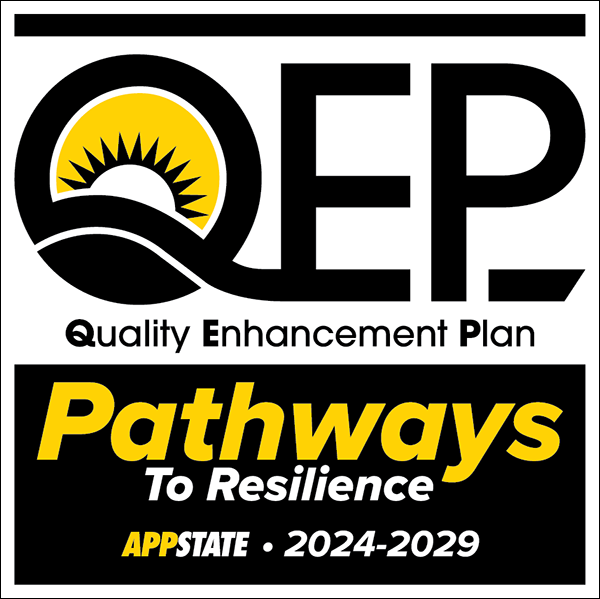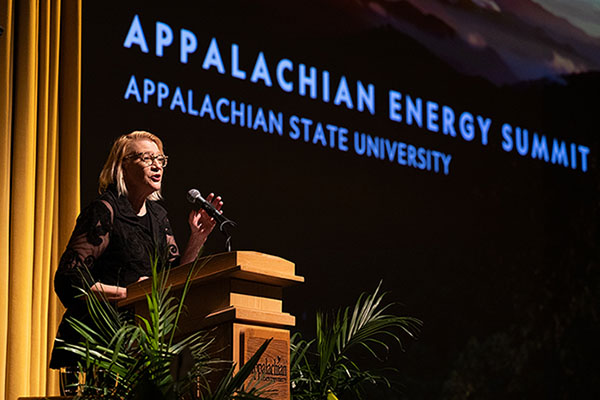
BOONE, N.C. — Beginning in fall 2024, Appalachian State University will initiate a new, five-year Quality Enhancement Plan (QEP) designed to prepare students to address climate resilience needs and opportunities across multiple disciplines, equipping them for the careers of tomorrow.
The QEP is part of App State’s reaccreditation with the Southern Association of Colleges and Schools Commission on Colleges and is an integral component of the university’s ongoing comprehensive planning and evaluation process. An effective QEP reflects and affirms a commitment to enhance overall institutional quality by focusing on an issue that a university considers a priority for improving student learning outcomes and success.

App State’s QEP topic, Pathways to Resilience, reflects the university’s unwavering commitment to educating students who are career-ready when they graduate. The effort will cultivate students’ resilience and confidence to excel in fields that are evolving to respond to climate disruption in ways that reduce harm and improve the well-being of communities, from local to global.
“The university’s sustainability tradition is already well known among students and employers — we have something really special here,” said QEP Director Shea Tuberty, professor in App State’s Department of Biology. “Pathways to Resilience positions the university at the forefront of solutions-oriented, interdisciplinary skills development, readying our graduates to be at the table to meet the world’s challenges.”
Laura England, QEP associate director and practitioner-in-residence in App State’s Department of Sustainable Development, said there is a growing recognition and public discourse about how climate change is reshaping the employment landscape.
“Many employers in a variety of fields want students to have climate knowledge, and we need to prepare our students so that they can get those jobs and be leaders in those fields,” said England.
Workforce demand for the knowledge, abilities, values and attitudes needed to live in, develop and support a sustainable and resource-efficient society — also known as “green skills” — is on the rise:
- Between February 2022 and February 2023, LinkedIn job postings requiring at least one green skill grew by a median of 15.2%, and the median LinkedIn hiring rate for workers with at least one green skill is 29% higher than the workforce average.
- Among Fortune Global 500 companies, 43% had a chief sustainability officer or equivalent as of 2023.
- The transition to a carbon-neutral economy and adaptation to a changing climate are driving job and skills growth across all industries, including energy, finance, emergency response, transportation, ecology, tourism, design, environmental health and safety.
- “Truth be told, in the coming decades every job will have a climate component, whether it’s financiers, doctors and nurses, farmers, accountants, sustainability officers or policymakers,” Anthony Leiserowitz, director of the Yale Program on Climate Change Communication, told USA Today. “It’s hard to imagine a field of employment that won’t need at least some expertise on climate change.”
App State’s QEP will advance student learning outcomes through general education and upper-level courses across disciplines, opportunities for scholarly research and creative activities, and supplementary education and engagement programs, such as speakers, events and exhibits.
With Pathways to Resilience, App State continues to be a leader in sustainable practices and education. App State houses the nation’s longest-running sustainable development degree program, as well as climate degrees and certificates offered through the Department of Geography and Planning and Department of Economics. The university is also home to numerous internationally recognized climate research programs, including Dr. Baker Perry’s weather station research at the world’s highest elevations.
App State has earned a Gold STARS (Sustainability, Tracking, Assessment and Rating System) rating from AASHE, the Association for the Advancement of Sustainability in Higher Education, for four consecutive rating cycles since 2012.
“App State is well known for this, and other institutions look at us as a model,” said England.
To prepare for the QEP launch, Tuberty and England have met with leaders of academic departments and colleges, as well as other App State divisions, to learn about how they are contributing to sustainability and climate efforts.
“We’ve been leaving no stone unturned, and we’ve been blown away by what’s already been integrated within our curricula and institutional processes,” said Tuberty. “We want our students to have a coherent conversation about mitigation and adaptation to climate through these solutions-focused avenues. If every department can teach through their particular lens, we can go out and fill those niches in society.”
The QEP will help support App State’s 2022–2027 strategic plan, specifically its Strengthen Resilience and Sustainability priority, which includes integrating sustainability across the curriculum.
Pathways to Resilience will be implemented from fall 2024 through 2029 and builds upon App State’s previous QEP topic of Global Learning.
To learn more about App State’s QEP, visit resilience.appstate.edu.
What do you think?
Share your feedback on this story.
Each car estimated to save more than $16K, nearly 35 metric tons of carbon emissions over 5 years
Dr. Brian Raichle joins Dr. Baker Perry and Sherpa team for weather station maintenance in Nepal
National Geographic CEO Jill Tiefenthaler shares international project updates with summit attendees
Plan proposes to train climate-literate workers and leaders to shape a just and resilient future
About Sustainability and Energy Management at App State
Appalachian State University’s leadership in sustainability is known nationally. The university’s holistic, three-branched approach considers sustainability economically, environmentally and equitably in relationship to the planet’s co-inhabitants. The university is an active steward of the state’s interconnected financial, cultural and natural resources and challenges students and others think critically and creatively about sustainability and what it means from the smallest individual action to the most broad-based applications. The university offers both undergraduate and graduate academic degree programs that focus on sustainability. In addition, 100 percent of Appalachian’s academic departments offer at least one sustainability course or course that includes sustainability, and all students graduate from programs that have adopted at least one sustainability learning outcome. Learn more at https://appstate.edu/sustainability.
About Appalachian State University
As a premier public institution, Appalachian State University prepares students to lead purposeful lives. App State is one of 17 campuses in the University of North Carolina System, with a national reputation for innovative teaching and opening access to a high-quality, cost-effective education. The university enrolls more than 21,000 students, has a low student-to-faculty ratio and offers more than 150 undergraduate and 80 graduate majors at its Boone and Hickory campuses and through App State Online. Learn more at https://www.appstate.edu.


















